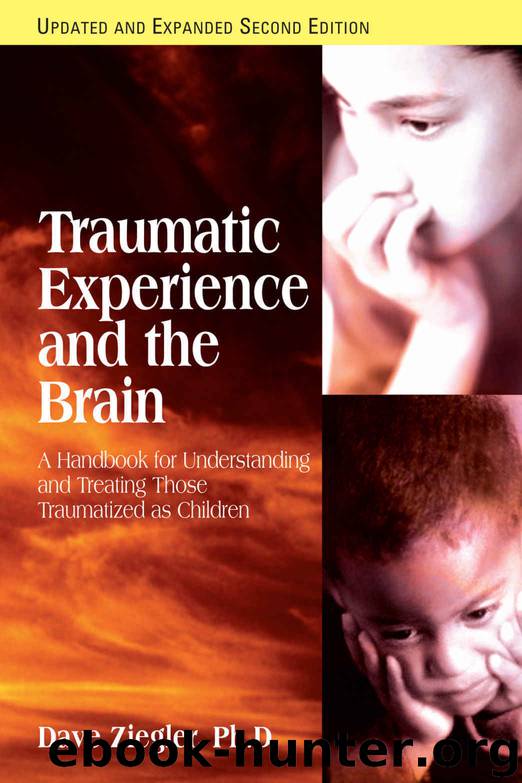Traumatic Experience and the Brain: A Handbook for Understanding and Treating Those Traumatized as Children by Ziegler Dave

Author:Ziegler, Dave [Ziegler, Dave]
Language: eng
Format: epub
Publisher: Acacia Publishing, Inc.
Published: 2015-04-06T16:00:00+00:00
Experience to Memory to Inner Working Models
Perhaps the first function of the brain, other than temperature regulation and homeostasis of the respiratory and circulatory systems, is receiving and processing sensory information. Input comes to the brain in the form of various types of stimuli that we have defined as sensory inputs—sight, sound, touch, taste, and smell. The jury is still out on the proverbial sixth sense that has been given many names—insight, intuition, extrasensory perception, meta awareness, collective consciousness and others. My mother, on a number of occasions, has shown she knows when something is not right with me, with no direct communication. Abused children at times have an understanding that defies explanation such as the following incident.
A five-year-old boy was placed in our program by a state agency for treatment. As a component of the assessment, the caseworker wanted the child to be evaluated by a specialist in another city. The caseworker picked up the five year old and transported him to the evaluation. Tragically, on the three-hour return trip, there was a fatal accident in which the caseworker was critically injured and the young boy was killed. Two children in this terrible situation demonstrated a perception that could not be explained.
First, the five-year-old, the day before the trip, cried and said he was very scared and did not want to go. This was unusual behavior and he was assured by everyone that he would enjoy the trip. He would not be comforted and said that he wanted to stay forever at our program. Following this tragedy, his mother granted his wish and his ashes were placed in a memorial garden at Jasper Mountain. Did he know something we did not?
The second child was his six-year-old roommate. After we were informed of the devastating news of the accident, I got the children together and told them. There were many tears and some of them were mine. The six year old roommate did not cry. This very disturbed child with autistic traits announced to the group in uncharacteristic verbal clarity, “He was in the back seat and needed help and his caseworker turned to help him but ran off the road. He is not coming back but he is fine where he is.” We were all stunned by his statement. Two weeks later we were informed that a truck driver had witnessed the caseworker turning toward the back seat as the car left the highway. What type of sensory information was this child picking up?
Another child in the program once told me she receives information from a sixth sense, but that it is too difficult to describe to me, and she may actually be correct.
I must confine our discussion here to what we do understand about sensory information. When sensory stimuli are received by the body, whether through the cones and rods leading to the optic nerve, the nerve endings on the lips, or taste buds of the tongue, the sensations are processed and information transmitted through electrical and chemical mechanisms to areas of the brain for “central office” consideration and processing.
Download
This site does not store any files on its server. We only index and link to content provided by other sites. Please contact the content providers to delete copyright contents if any and email us, we'll remove relevant links or contents immediately.
Rewire Your Anxious Brain by Catherine M. Pittman(18643)
Talking to Strangers by Malcolm Gladwell(13347)
The Art of Thinking Clearly by Rolf Dobelli(10454)
Mindhunter: Inside the FBI's Elite Serial Crime Unit by John E. Douglas & Mark Olshaker(9322)
Becoming Supernatural by Dr. Joe Dispenza(8201)
Change Your Questions, Change Your Life by Marilee Adams(7759)
Nudge - Improving Decisions about Health, Wealth, and Happiness by Thaler Sunstein(7692)
The Road Less Traveled by M. Scott Peck(7594)
The Lost Art of Listening by Michael P. Nichols(7494)
Mastermind: How to Think Like Sherlock Holmes by Maria Konnikova(7323)
Enlightenment Now: The Case for Reason, Science, Humanism, and Progress by Steven Pinker(7306)
Win Bigly by Scott Adams(7184)
The Way of Zen by Alan W. Watts(6601)
Daring Greatly by Brene Brown(6502)
Big Magic: Creative Living Beyond Fear by Elizabeth Gilbert(5755)
Grit by Angela Duckworth(5604)
Ego Is the Enemy by Ryan Holiday(5414)
Men In Love by Nancy Friday(5234)
The Laws of Human Nature by Robert Greene(5172)
